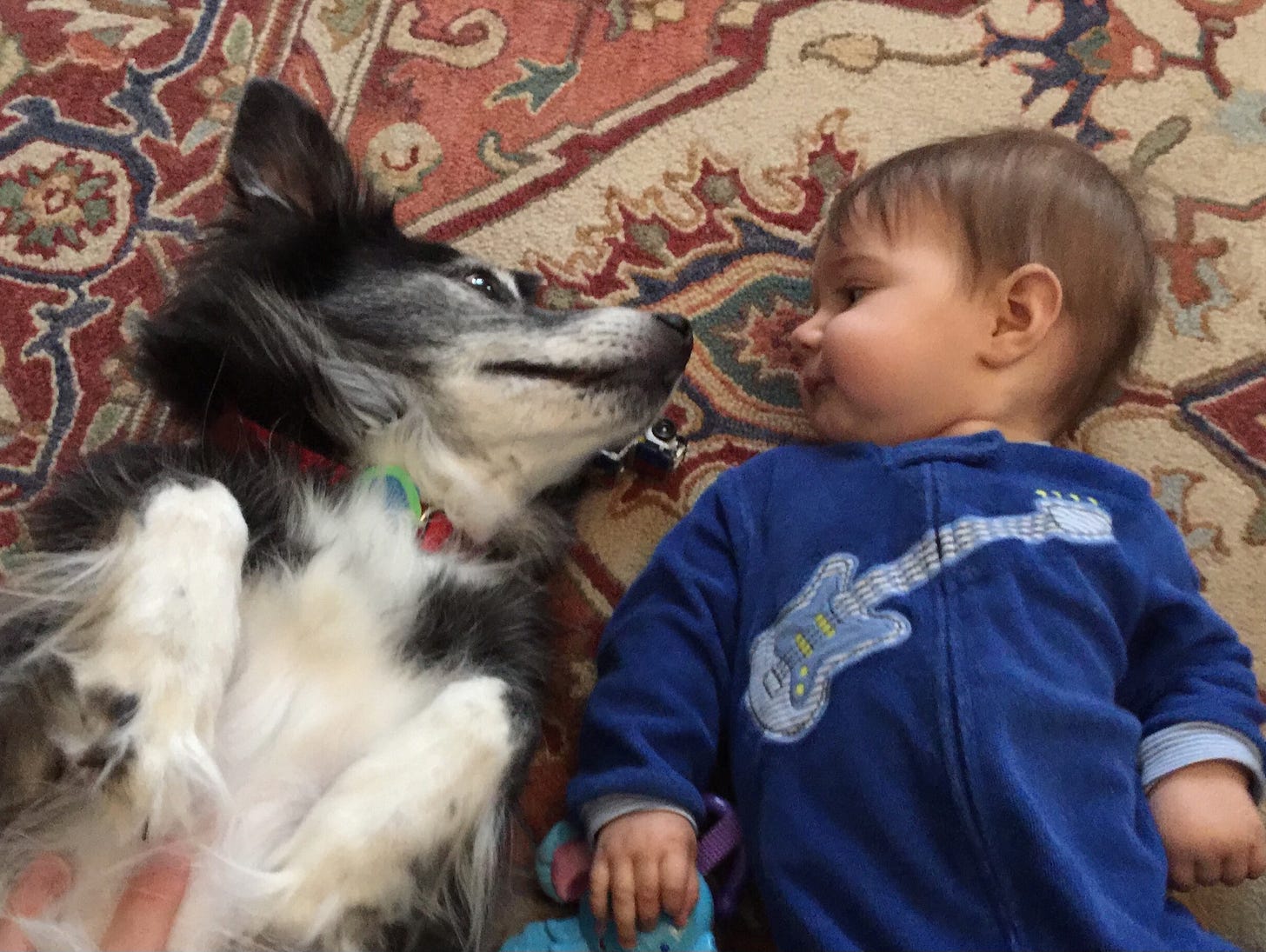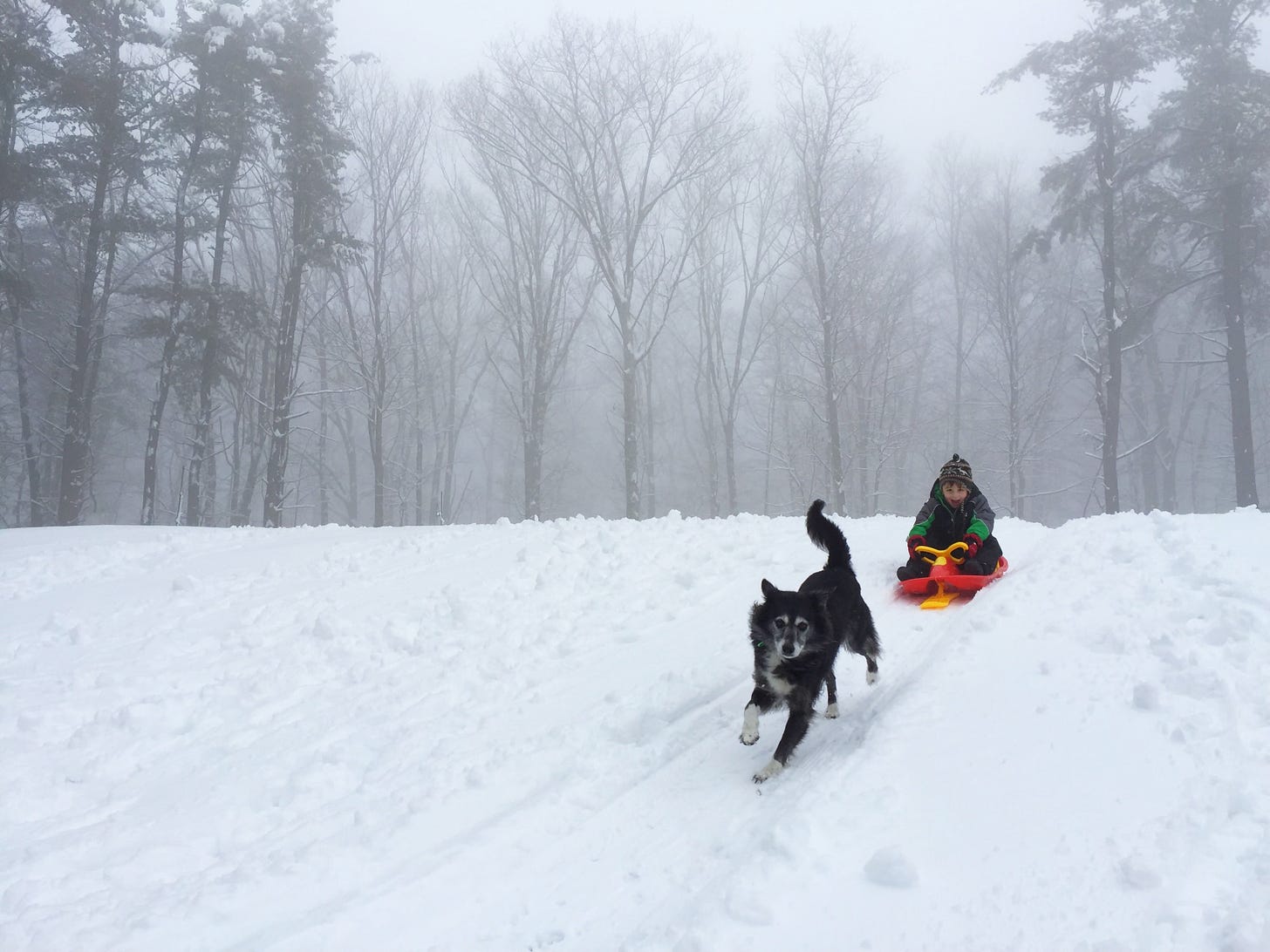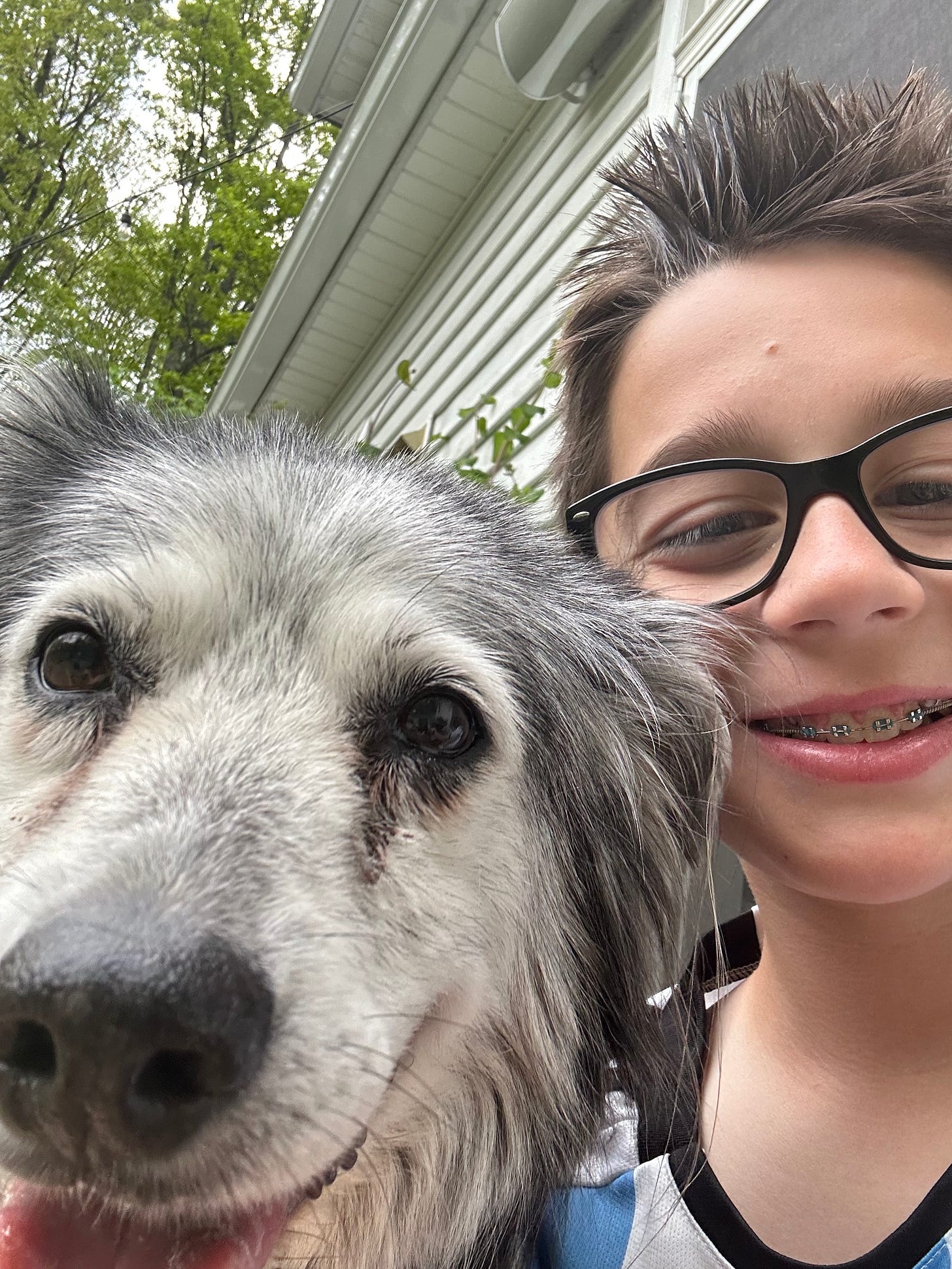Coping With the Loss of a Cherished Pet
Three ways we prepared our kids for our dog's death.
Sorry that this newsletter is a bit late, everyone — it’s been a rough couple of days. This past weekend, we lost our beloved 14-year-old dog, Henry. Yesterday, my kids’ school went into lockdown for an hour after our school resource officer heard sounds that could have been gunshots — but, thankfully, weren’t. (Everyone is physically okay, and the teachers and administrators handled the situation beautifully, but the kids — and I, and our entire community — are still processing the terrifying experience.)
I’ll write more about the lockdown soon, but for now, I want to focus on how we as a family are coping with the loss of Henry. My husband and I rescued Henry from a shelter before we got married, and he’s the reason that our son’s very first word was “doggie.” When we lived in Brooklyn, we took Henry to Prospect Park every morning, where he loved to swim in the pond and play with other pups. Here in the Hudson Valley, we regularly took him on hikes. He loved treats, and beaches, and treats, and walks, and treats. And us, of course. And we loved him back with all our hearts.
Over the past six months or so — and especially over the past month — Henry’s health declined. He had trouble standing up and walking; he’d lost control of his bowels; he was always panting and seemed uncomfortable. My husband and I met with our vet a few weeks ago, who told us that it would be a good time to consider euthanasia. I’d never gone through that with a pet before and wasn’t quite sure what to expect, but based on what our vet told us, Henry was probably in constant pain, and letting him go would be the ethical thing to do.
As a parent, I was more worried about my kids’ grief than my own. I knew that my 12-year-old, in particular, had a deep bond with Henry and would be devastated by his death. But I also knew that it wasn’t fair to delay Henry’s death just because we didn’t want to face it.
Remembering conversations I’ve had over the years with experts on grief, my husband and I came up with a plan with how to talk to the kids about Henry’s death. Today I’m sharing three things we said that really seemed to help them, in case they’d be useful for you in the future if you ever have to cope with a pet’s death.
We explained that euthanizing Henry was an act of love.
When I first tried to explain to my kids that we were going to put Henry down — this was a few weeks ago — they were horrified. My 12-year-old said something like, “You’re going to murder Henry???” I realized I needed to find a way to describe the rationale behind our decision in a way they would understand.
I explained that when animals (and people) age, they can become increasingly uncomfortable, and even live in constant pain. This can be a hard concept for kids who have been fortunate enough to live without much pain, so I tried to find different ways of describing it. I said that Henry was likely in pain much if not all the time, and that although he couldn’t directly communicate that to us, he was revealing it in his behavior — his panting, frequent pacing, and inability to settle. I said that Henry has given us so much love for so long, and that one way we could show our love for him would be to free him of his pain.
My 12-year-old said something like, “So do you think he would ask to be put down, if he could talk?” And I said something like, “Yes, I think he would.” My son then mentioned that he’s seen movies where animals that are in pain are put out of their misery by humans as an act of kindness, and that he understood that this situation with Henry was analogous.
The day of Henry’s death, my son said that he wasn’t nearly as sad about it as he had been, because he knew that helping him die was the kind thing to do.
We didn’t invite the kids to watch Henry’s death, but we would have let them if they’d asked.
My husband and I thought a lot about how to manage the logistics of Henry’s death. We knew we didn’t want our kids to feel obligated to watch it — that might be too much — but we also knew there was a chance they would request it. We decided they were old enough, at 12 and 8, to attend his death if they really, really wanted to. We deliberately scheduled the euthanasia on a school day (this past Friday) so that it was clear that the expectation was that they would not have to attend, but we decided we would pull one or both of them out of school if they wanted to be there.
When we explained the logistics to the kids, we told them we would bring them to school late on the day of his death so they would have extra time to say goodbye. We then waited to see if they would plead with us to come with us to the vet, but neither of them did. On the actual day (and the days leading up to it) we gave Henry lots of treats and love, and when it was finally time to go to school on Friday (we had set a specific but arbitrary time, telling them we’d take them to school at 9am), the kids handled it admirably. It was a quiet and sad car ride to school, but everyone did okay.
We told them there is no “one right way” to grieve.
Remembering something I learned when reporting a piece for The New York Times on children’s grief, I decided to tell my kids that there are many ways to grieve. My 8-year-old in particular didn’t seem as sad about Henry’s death as my 12-year-old did, and I didn’t want her to feel guilty about that. At dinner the night before his death, I said something like, “I want you to know that there is no one right way to grieve. You might feel sad one minute, and then not sad at all the next. Or you might not feel that sad at all, ever! And that’s okay. Everybody grieves differently. Even if you’re not feeling sad, that doesn’t mean you didn’t love Henry.”
Later on that night, right before bed, my 8-year-old said she’d been worried about not feeling sad enough, and that it was really helpful to know that that was okay. I said that my sadness came and went, too, and that anything we felt in the coming weeks and months was totally healthy and normal. (Also — an aside — we got a second dog a few years ago, and I think having him at home has made the transition a lot easier.)
As for how we’re doing now, we’re doing alright. I find that my grief comes in waves, often when I least expect it. (I have definitely been crying the entire time I’ve been writing this newsletter.) I’m also having flashbacks to the actual moment of his death, which was so bittersweet — Henry looked peaceful and calm for the first time in a long time, but I still feel overwhelming pain for having made the choice to end his life. It’s a lot of responsibility to bear, even though I know it was the right thing to do.
We’re going to be okay. But it’s going to take some time.







I’m crying now, too. Thanks for sharing this with us! Thanks too for saying you were with Henry when he passed. I have recently heard that many people don’t stay with their pets for the whole process, and it’s apparently heartbreaking for veterinarians. I appreciate that you pointed out the peacefulness you saw in him! Makes it less scary when it’s my turn to go down that road with my own dog. Sob. Thanks again and so many hugs to all of you.
Absolutely sobbing. Henry was just the best and I'll especially remember his devotion to any cheese left at coffee table height. Love how you navigated this with the kids. What a great week we are having for light and easy parenting moments!